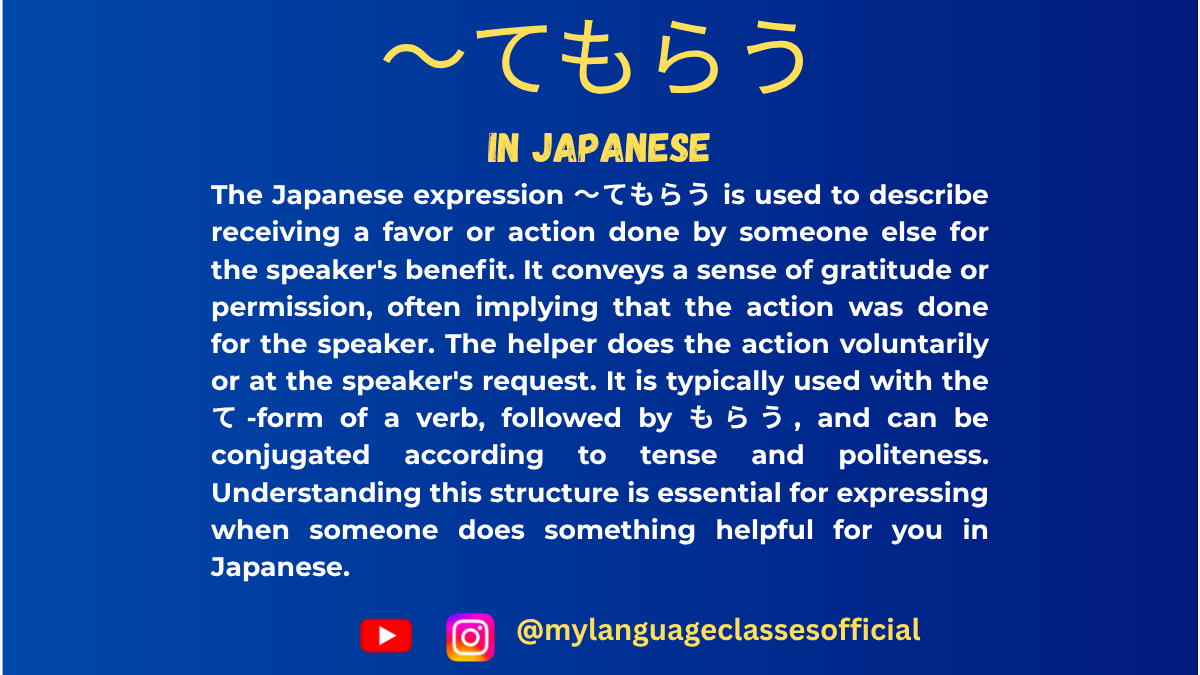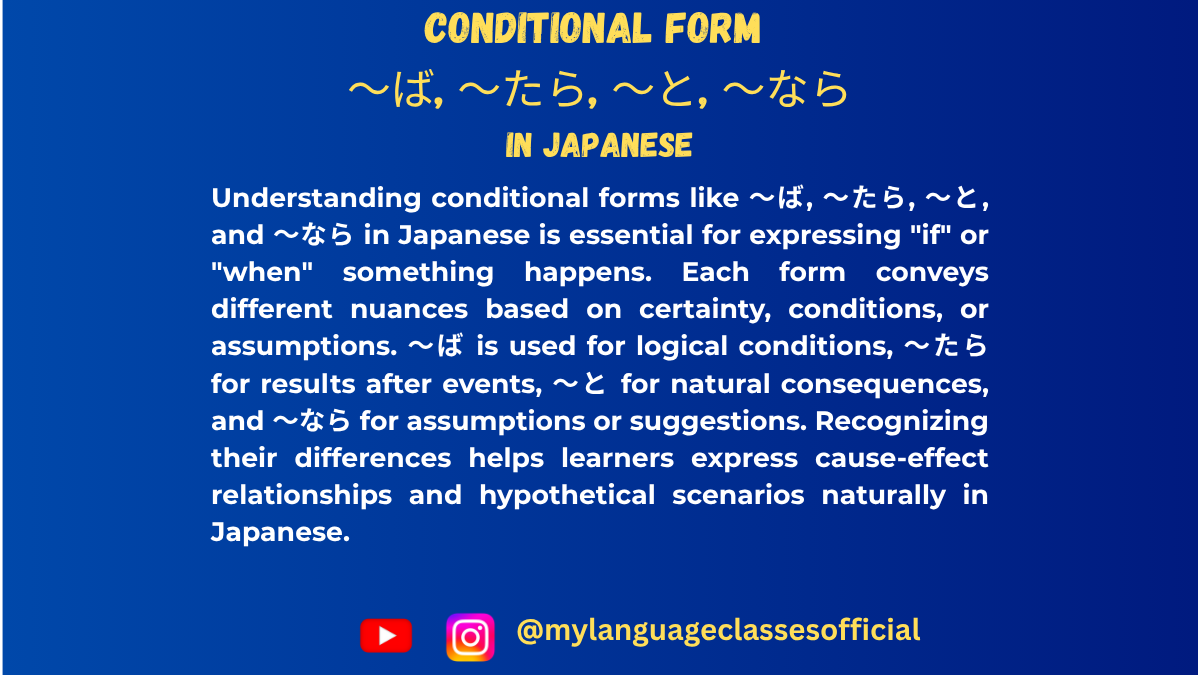Your cart is currently empty!
Tag: Japanese grammar explanation
-

How to Use 〜てもらう | My Language Classes
The Japanese Grammar 〜てもらう
The Japanese grammar pattern 〜てもらう is an essential structure used to express receiving a favor from someone. It emphasizes that someone is doing something beneficial for the speaker or a third party. Understanding this grammar is crucial for natural and polite Japanese communication.
This post will explain 〜てもらう in various situations, provide example sentences, and list common contexts where it is used.
Structure of 〜てもらう
The pattern follows this structure:
Person A (receiver) + は/が + Person B (doer) + に + Verb in 〜て form + もらう
- A is the person who benefits from the action.
- B is the person performing the action for A.
- The verb is conjugated into the て-form and followed by もらう (to receive).
Example:
- 私は先生に日本語を教えてもらいました。
(I had my teacher teach me Japanese.)
Difference Between 〜てもらう and 〜てあげる
- 〜てもらう: Focuses on the receiver of the favor.
- 〜てあげる: Focuses on the giver of the favor.
Example:
- 私は先生に日本語を教えてもらいました。 (I received Japanese lessons from my teacher.)
- 私は先生に日本語を教えてあげました。 (I taught Japanese to my teacher.)
Various Situations Where 〜てもらう Is Used
1. Receiving Help
When someone helps you with a task or does something for your benefit.
Example:
- 私は彼氏に財実を送ってもらいました。
(I had my boyfriend send my wallet.)
2. Receiving Permission
Used when asking for permission to do something.
Example:
- 先生にはやく帰らせてもらいました。
(I got permission from my teacher to leave early.)
3. Receiving a Favor Indirectly
You receive a favor, but a third party performs the action.
Example:
- 母は先生にむすこの学校の事を説明してもらいました。
(My mother had the teacher explain about the school to her.)
4. Making Polite Requests
When requesting someone to do something politely.
Example:
- この文章を正しく直してもらえますか。
(Could you please correct this text for me?)
5. Receiving Information
When someone shares knowledge or guidance.
Example:
- 先生にいろいろな情報を教えてもらいました。
(I received a lot of information from my teacher.)
6. Asking for Medical Assistance
Used when getting treatment or medical help from someone.
Example:
- 医者に病治をしてもらいました。
(I got treated by the doctor.)
7. Receiving a Physical Object
Used when someone gives you something.
Example:
- 友人に好きな本を買ってもらいました。
(My friend bought me a book I like.)
8. Receiving Guidance or Instructions
Used when someone teaches you or gives instructions.
Example:
- 先生に作文の書き方を教えてもらいました。
(I had my teacher teach me how to write essays.)
Summary of Situations Where 〜てもらう Is Used
Here’s a quick reference list:
- Receiving help (task-related support)
- Receiving permission
- Receiving a favor indirectly
- Making polite requests
- Receiving information or knowledge
- Asking for medical assistance
- Receiving a physical object
- Receiving guidance or instructions
Conclusion
〜てもらう is a crucial grammar point in Japanese, allowing you to express receiving favors, help, or benefits from others. Mastering this structure enhances your ability to communicate politely and effectively in various situations. Practice using it in conversations to improve fluency and comprehension!
If you enjoyed this lesson, be sure to check out more posts like this on my blog at My Language Classes. Don’t forget to subscribe my YouTube channel and follow me on Instagram for the latest language learning tips and lessons. Leave a comment below to share your thoughts, or ask any questions you have about nouns.
Happy learning! 😊
-

All Japanese Conditionals 〜ば, 〜たら, 〜と, 〜ならExplained | My Language Classes
Japanese Conditional Forms: 〜ば, 〜たら, 〜と, 〜なら Explained
In Japanese, conditional and hypothetical sentences are commonly expressed using four key grammatical structures: 〜ば, 〜たら, 〜と, and 〜なら. Each has unique nuances and appropriate usage contexts. In this article, we will explore each form, compare them, and provide a list of situations where they are used.
1. 〜ば (Ba-form)
Usage:
- Expresses general conditions and hypothetical situations.
- Often used in formal speech and writing.
- Cannot be used for past events.
- Cannot be used with volitional expressions (e.g., requests, invitations).
Formation:
Verb Type Formation Ichidan (る-verbs) Drop る + れば (e.g., 食べる → 食べれば) Godan (う-verbs) Change last う-row syllable to え-row + ば (e.g., 行く → 行けば) Adjectives (い-adj.) Drop い + ければ (e.g., 安い → 安ければ) Nouns/な-adjectives + ならば (e.g., 便利ならば) Examples:
- 早く行けば、電車に間に合いますよ。(If you go early, you will catch the train.)
- お金があれば、旅行したいです。(If I have money, I want to travel.)
- 静かであれば、勉強しやすいです。(If it is quiet, it is easy to study.)
2. 〜たら (Tara-form)
Usage:
- Used for general conditions, past conditions, and hypothetical situations.
- Can be used in past, present, or future contexts.
- Can be used with volitional expressions (e.g., requests, invitations).
Formation:
Word Type Formation Verbs (Past た-form + ら) 飲む → 飲んだら い-adjectives 楽しい → 楽しかったら な-adjectives / Nouns 簡単だ → 簡単だったら Examples:
- 雨が降ったら、家にいます。(If it rains, I will stay home.)
- お金があったら、旅行に行きたいです。(If I had money, I would travel.)
- 暇だったら、手伝ってください。(If you are free, please help.)
3. 〜と (To-form)
Usage:
- Expresses natural consequences, habitual results, and general truths.
- Does not express personal volition or future uncertainty.
- Common in proverbs and scientific facts.
Formation:
Word Type Formation Verbs (Dictionary form + と) 行く → 行くと い-adjectives 高い → 高いと な-adjectives / Nouns 便利だ → 便利だと Examples:
- 春になると、桜が咲きます。(When spring comes, cherry blossoms bloom.)
- このボタンを押すと、ドアが開きます。(If you press this button, the door will open.)
- 夜になると、気温が下がります。(When it becomes night, the temperature drops.)
4. 〜なら (Nara-form)
Usage:
- Used for assumptions, recommendations, and contextual conditions.
- Often used in conversations.
- Used when giving advice or referring to prior information.
Formation:
Word Type Formation Verbs (Dictionary form + なら) 行く → 行くなら い-adjectives 面白い → 面白いなら な-adjectives / Nouns 簡単だ → 簡単なら Examples:
- 日本に行くなら、京都を訪れるべきです。(If you go to Japan, you should visit Kyoto.)
- お金がないなら、アルバイトをしたほうがいい。(If you don’t have money, you should get a part-time job.)
- 映画を見るなら、ポップコーンを買いましょう。(If we’re watching a movie, let’s buy popcorn.)
5. Comparison Table: 〜ば vs. 〜たら vs. 〜と vs. 〜なら
Condition Type 〜ば 〜たら 〜と 〜なら General Conditions ✅ ✅ ✅ ✅ Hypothetical Situations ✅ ✅ ❌ ✅ Past Situations ❌ ✅ ❌ ✅ Natural Consequences ❌ ❌ ✅ ❌ Volitional Expressions ❌ ✅ ❌ ✅ Recommendations/Advice ❌ ❌ ❌ ✅
6. Situations Where They Are Used
Situation Example Best Form If it rains, I will stay home. 雨が降ったら、家にいます。 〜たら If you push this button, the door will open. このボタンを押すと、ドアが開きます。 〜と If I had money, I would travel. お金があれば、旅行したい。 〜ば If you are free, please help me. 暇だったら、手伝ってください。 〜たら If you go to Japan, you should visit Kyoto. 日本に行くなら、京都を訪れるべきです。 〜なら If you don’t study, you will fail the exam. 勉強しないと、試験に落ちる。 〜と
Conclusion
Each of these conditional forms—〜ば, 〜たら, 〜と, and 〜なら—has its specific nuances and contexts. By mastering these distinctions, learners can express conditional and hypothetical ideas naturally and accurately in Japanese. Understanding when to use each structure will significantly improve fluency and comprehension.
If you enjoyed this lesson, be sure to check out more posts like this on my blog at My Language Classes. Don’t forget to subscribe my YouTube channel and follow me on Instagram for the latest language learning tips and lessons. Leave a comment below to share your thoughts, or ask any questions you have about nouns.
Happy learning! 😊
